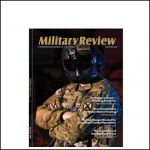
e-Document
|
Military Review, July-August 2005.
Copies
0 Total copies, 0 Copies are in,
0 Copies are out.
Full Spectrum Operations
Winning the Peace: The Requirement for Full-Spectrum Operations. Major General Peter W. Chiarelli, U.S. Army, and Major Patrick R. Michaelis, U.S. Army; Task Force Baghdads campaign plan created the conditions to keep our soldiers safe and our homeland sound.
An Organizational Solution for DODs Cultural Knowledge Needs. Montgomery McFate, Ph.D., J.D., and Andrea Jackson; The United States should develop a specialized organization to produce, collect, and centralize cultural knowledge within the Department of Defense.
Current and Future Warfighting
Patterns of Insurgency and Counterinsurgency. John A. Lynn, Ph.D.; State building, peacekeeping, and counterinsurgency are not military operations other than war; they are war.
Is There a Deep Fight in a Counterinsurgency? Major Lee K. Grubbs, U.S. Army, and Major Michael J. Forsyth, U.S. Army; Is there depth in the nonlinear battlefield? If so, how can planners develop concepts for achieving operational effects that defeat insurgencies?
Stay the Course: Nine Planning Themes for Stability and Reconstruction Operations. Lieutenant Colonel David P. Cavaleri, U.S. Army, Retired; Nine planning themes including legitimacy, security, unity of effort, and commitment apply to stability and reconstruction operations in the Global War on Terrorism.
Latin America
Defining Venezuelas Bolivarian Revolution. Harold A. Trinkunas, Ph.D.; Venezuelas foreign relations, particularly its growing closeness to Cuba, Iran, Russia, and China, disturb many in the U.S. foreign policy establishment.
The Battle of Darwin-Goose Green. Robert S. Bolia; Based on the forces available and commonly accepted military doctrine, Argentina should not have lost the Falklands War so easily.
War in Algeria: The French Experience. Colonel Gilles Martin, French Army; For the French Army, the end of the war in Algeria was a terrible ordeal, but the Algerian war had at least one benefit: young officers read the stories of their predecessors.
Transformation
Why Small Brigade Combat Teams Undermine Modularity. Lieutenant Colonel Stephen L. Melton, U.S. Army, Retired; Transformation will not achieve its intended objectives if the Army maintains Brigade Combat Teams as they are currently designed.
Growing the Iraqi Security Forces. Major Steven M. Miska, U.S. Army; The U.S. tactical victory in Samarra was the equivalent of giving Iraqi citizens a fish. Building an Iraqi Security Force taught them how to fish.
Marketing: An Overlooked Aspect of Information Operations. Captain Stoney Trent, U.S. Army, and Captain James L. Doty III, U.S. Army; Information operations are too crucial and complex not to demand the best marketers the United States has to offer.
Ultramicro, Nonlethal, and Reversible: Looking Ahead to Military Biotechnology. Colonel Guo Ji-Wei, The Peoples Liberation Army, China, and Xue-Sen Yang; Biotechnological weapons, superior to conventional weapons, can injure the enemys genes or protein structure. Only after obvious wounding will he realize he is under attack.
Guantanamo
Defining Success at Guantanamo: By What Measure? Jeffrey H. Norwitz
Generational Differences in Waging Jihad. Chief Warrant Officer 3 Sharon Curcio, U.S. Army Reserve
Insights
Clausewitz: On Afghanistan. Major Frank Sobchak, U.S. Army
Fox Conner and Dwight Eisenhower: Mentoring and Application. Jerome H. Parker IV
Book Reviews
Title
Military Review, July-August 2005.
Call No
CDMC Military Review
Digital Link
Subjects
Language
English
Published
Fort Leavenworth, KS : Combined Arms Center,, 2005.
Series
Target Audience
Unknown or not specified









